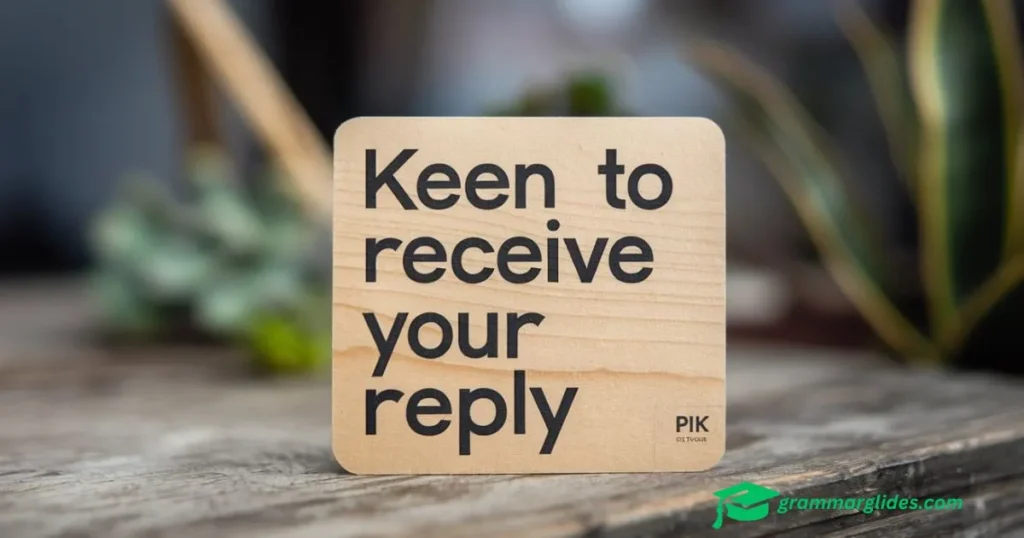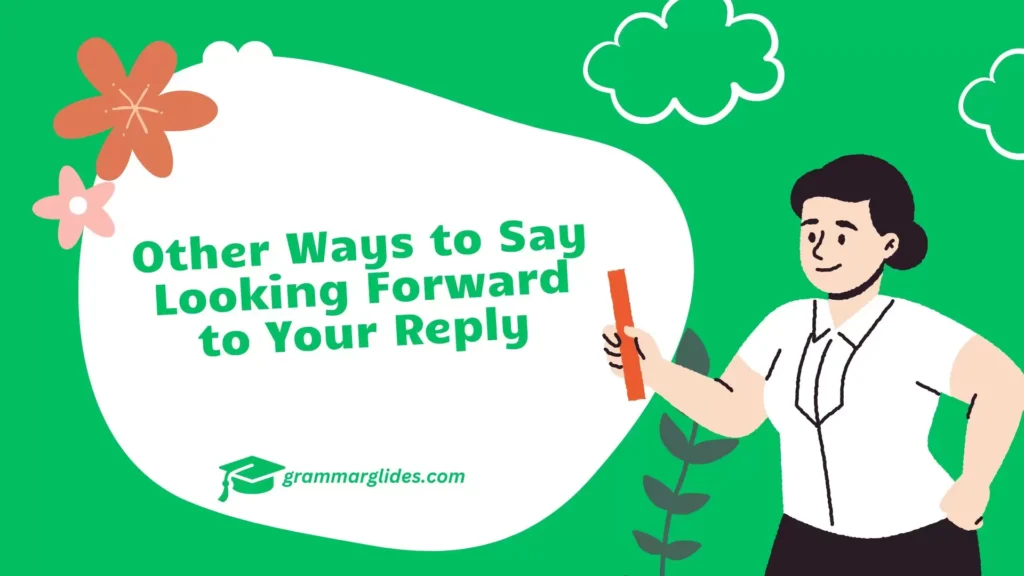When you’re waiting for a response, whether it’s a professional email or a casual message, how you express your anticipation can set the tone for the conversation. While “Looking forward to your reply” is a common and polite phrase, there are many other ways to convey your eagerness and expectation.
This blog post explores 30 alternative ways to say you’re eagerly awaiting a response, complete with scenarios, examples, and explanations.
1. Eager to Hear From You
Scenario: You’ve sent a follow-up email after an initial meeting.
Example 1: “Eager to hear from you regarding the next steps we discussed. Thank you!”
Example 2: “I’m eager to hear your thoughts on the proposal. Looking forward to your feedback.”
Explanation: This phrase conveys enthusiasm and anticipation for the recipient’s response.
2. Anticipating Your Response
Scenario: You’ve requested information from a colleague.
Example 1: “Anticipating your response on the project details. Thanks in advance for your help.”
Example 2: “I’m anticipating your feedback on the report. Your input will be greatly appreciated.”
Explanation: “Anticipating” suggests you’re expecting their reply and value their input.
3. Awaiting Your Feedback

Scenario: You’ve submitted a draft for review.
Example 1: “Awaiting your feedback on the draft. I look forward to your insights.”
Example 2: “I’m awaiting your feedback on the proposal and am keen to make any necessary adjustments.”
Explanation: This phrase emphasizes that you’re waiting for their review or comments.
4. Eagerly Awaiting Your Reply
Scenario: You’ve sent a job application.
Example 1: “Eagerly awaiting your reply regarding my application. Thank you for considering me.”
Example 2: “I’m eagerly awaiting your response and hope to discuss the opportunity further.”
Explanation: “Eagerly awaiting” highlights your excitement and anticipation for their response.
5. Excited to Receive Your Reply
Scenario: You’ve inquired about a potential partnership.
Example 1: “Excited to receive your reply and discuss how we can collaborate.”
Example 2: “I’m excited to hear back from you about the partnership proposal. Looking forward to it!”
Explanation: This phrase conveys enthusiasm and positive anticipation for their reply.
6. Looking Forward to Your Thoughts
Scenario: You’ve asked for feedback on a presentation.
Example 1: “Looking forward to your thoughts on the presentation. I appreciate your input.”
Example 2: “I’m eager to hear your thoughts on the draft. Your feedback will be invaluable.”
Explanation: “Looking forward to your thoughts” emphasizes the importance of their opinion.
7. Hoping to Hear From You Soon
Scenario: You’ve sent a reminder about a pending request.
Example 1: “Hoping to hear from you soon about the status of my request. Thank you.”
Example 2: “I’m hoping to receive a response soon regarding the project update.”
Explanation: This phrase conveys a gentle nudge while expressing hope for a prompt reply.
8. Waiting for Your Update

Scenario: You’ve asked for a status update on a task.
Example 1: “Waiting for your update on the project timeline. Looking forward to your response.”
Example 2: “I’m waiting for your update on the request and appreciate your prompt attention.”
Explanation: “Waiting for your update” directly expresses your anticipation for their information.
9. Hoping for a Swift Reply
Scenario: You’ve inquired about a time-sensitive issue.
Example 1: “Hoping for a swift reply regarding the urgent matter. Thank you for your quick attention.”
Example 2: “I’m hoping for a swift response to my inquiry. Your prompt reply would be greatly appreciated.”
Explanation: This phrase emphasizes the urgency and need for a quick response.
10. Looking Forward to Your Insights
Scenario: You’ve asked for expert advice on a topic.
Example 1: “Looking forward to your insights on the matter. Your expertise is greatly valued.”
Example 2: “I’m eager to receive your insights and guidance. Thank you for your time.”
Explanation: “Looking forward to your insights” highlights the value you place on their expert opinion.
11. Excited to Continue the Conversation
Scenario: You’ve had an initial discussion and are awaiting further input.
Example 1: “Excited to continue the conversation and hear more about your ideas.”
Example 2: “I’m looking forward to continuing our discussion. Awaiting your response.”
Explanation: This phrase shows enthusiasm for further dialogue and continued interaction.
12. Eager for Your Response
Scenario: You’ve requested information from a contact.
Example 1: “Eager for your response to my inquiry. Thank you for your attention.”
Example 2: “I’m eager to hear back from you regarding the details I requested.”
Explanation: “Eager for your response” conveys strong anticipation and interest in their reply.
13. Waiting to Hear Back

Scenario: You’ve sent a proposal for review.
Example 1: “Waiting to hear back from you about the proposal. Your feedback will be appreciated.”
Example 2: “I’m waiting to hear back regarding the proposal and am keen to make any necessary revisions.”
Explanation: This phrase directly communicates your expectation of a response.
14. Keen to Get Your Reply
Scenario: You’ve sent a request for clarification.
Example 1: “Keen to get your reply regarding the clarification. Your response will be helpful.”
Example 2: “I’m keen to receive your reply and understand more about the details.”
Explanation: “Keen to get your reply” emphasizes eagerness and interest in their response.
15. Anticipating Your Update
Scenario: You’ve asked for a progress report.
Example 1: “Anticipating your update on the project. Looking forward to hearing from you.”
Example 2: “I’m anticipating your update and appreciate your prompt attention.”
Explanation: This phrase focuses on the expectation of receiving an update or progress report.
16. Looking Forward to Your Answer
Scenario: You’ve posed a question in an email.
Example 1: “Looking forward to your answer to my question. Thank you for your time.”
Example 2: “I’m eager to receive your answer and appreciate your help with this matter.”
Explanation: “Looking forward to your answer” directly expresses anticipation for their response.
17. Hoping to Receive Your Thoughts Soon
Scenario: You’ve asked for feedback on a draft.
Example 1: “Hoping to receive your thoughts soon on the draft. Your feedback is important.”
Example 2: “I’m hoping to get your thoughts soon. Looking forward to your feedback.”
Explanation: This phrase expresses hope for timely feedback and emphasizes its importance.
18. Excited to Read Your Response
Scenario: You’ve asked for a review of a document.
Example 1: “Excited to read your response and get your thoughts on the document.”
Example 2: “I’m looking forward to reading your response and incorporating your feedback.”
Explanation: “Excited to read your response” conveys enthusiasm for their reply and feedback.
19. Eagerly Awaiting Your Update
Scenario: You’ve requested a status update on a project.
Example 1: “Eagerly awaiting your update on the project’s progress. Thank you!”
Example 2: “I’m eagerly awaiting your update and appreciate your attention to this matter.”
Explanation: This phrase highlights enthusiasm and anticipation for an update.
20. Hoping for Your Feedback

Scenario: You’ve asked for input on a proposal.
Example 1: “Hoping for your feedback on the proposal. Your thoughts will be valuable.”
Example 2: “I’m hoping to receive your feedback soon and make any necessary adjustments.”
Explanation: “Hoping for your feedback” expresses a desire for their input and acknowledges its value.
21. Looking Forward to Your Thoughts
Scenario: You’ve requested an opinion on a project.
Example 1: “Looking forward to your thoughts on the project. Your insights are appreciated.”
Example 2: “I’m eager to hear your thoughts and discuss the project further.”
Explanation: This phrase emphasizes anticipation for their opinions and insights.
22. Excited to Get Your Thoughts

Scenario: You’ve asked for comments on a draft report.
Example 1: “Excited to get your thoughts on the draft report. Your feedback will be useful.”
Example 2: “I’m looking forward to getting your thoughts and making improvements based on your input.”
Explanation: “Excited to get your thoughts” conveys enthusiasm for receiving their comments.
23. Hoping for a Prompt Response
Scenario: You’ve requested information urgently.
Example 1: “Hoping for a prompt response to my urgent request. Thank you for your quick attention.”
Example 2: “I’m hoping for a prompt reply and appreciate your swift action on this matter.”
Explanation: This phrase indicates urgency and the need for a quick response.
24. Keen to Receive Your Reply

Scenario: You’ve sent a query about an upcoming event.
Example 1: “Keen to receive your reply regarding the event details. Looking forward to your response.”
Example 2: “I’m keen to get your reply and finalize the arrangements for the event.”
Explanation: “Keen to receive your reply” expresses enthusiasm and readiness for their response.
25. Looking Forward to Your Response
Scenario: You’ve asked for confirmation of a meeting.
Example 1: “Looking forward to your response regarding the meeting schedule. Thank you.”
Example 2: “I’m eagerly awaiting your response to confirm the meeting details.”
Explanation: This phrase directly expresses anticipation for confirmation and feedback.
26. Hoping for Your Insight Soon
Scenario: You’ve asked for professional advice.
Example 1: “Hoping for your insight soon on the matter. Your expertise will be greatly valued.”
Example 2: “I’m looking forward to receiving your insight and advice on the issue.”
Explanation: “Hoping for your insight” focuses on the value of their professional advice.
Other Ways to Say I Hope This Doesn’t Cause Any Inconvenience
27. Eager to Get Your Feedback

Scenario: You’ve submitted a draft for review.
Example 1: “Eager to get your feedback on the draft. Your comments will be very helpful.”
Example 2: “I’m excited to receive your feedback and make any necessary revisions.”
Explanation: “Eager to get your feedback” expresses enthusiasm for their input and comments.
28. Looking Forward to Your Input
Scenario: You’ve asked for suggestions on a project.
Example 1: “Looking forward to your input on the project. Your suggestions will be appreciated.”
Example 2: “I’m eager to receive your input and discuss the project further.”
Explanation: This phrase conveys anticipation for their contributions and suggestions.
29. Anticipating Your Thoughts
Scenario: You’ve asked for someone’s opinion on a decision.
Example 1: “Anticipating your thoughts on the decision we need to make. Thank you for your input.”
Example 2: “I’m looking forward to your thoughts and discussing the next steps.”
Explanation: “Anticipating your thoughts” emphasizes the expectation of their opinion.
30. Excited to Hear Back From You
Scenario: You’ve inquired about potential collaboration.
Example 1: “Excited to hear back from you about the collaboration opportunity. Looking forward to it!”
Example 2: “I’m eager to hear back and discuss how we can work together.”
Explanation: This phrase conveys enthusiasm and anticipation for a response regarding collaboration.
Conclusion
Expressing your anticipation for a reply in various ways can add a personal touch and convey your level of enthusiasm. Whether through phrases that show eagerness, excitement, or simply hope for a prompt response, choosing the right words can enhance your communication and foster positive interactions.
By using these alternative phrases, you can effectively convey your anticipation and maintain a courteous and engaging tone in your correspondence.

Hi! I’m Lauren Reynolds, the author of Grammar Glides. I create easy-to-follow content that helps you master English with confidence. Let’s make learning English simple and enjoyable together!

